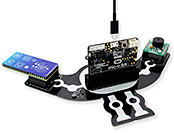
|
|
The BBC micro:bit is a credit card sized microcontroller development system, with a very simple and user-friendly visual programming interface, designed to introduce the kids to the world of embedded electronics. The micro:bit project is managed by the micro:bit Educational Foundation. This foundation is a non-profit organization with a very noble goal: giving children around the world a chance to get creative with the technology. You can find more information about the micro:bit project on the official web page.
However, this little development system can be interesting even for more experienced developers, because in its heart, there is a powerful nRF51822 MCU, a 16 MHz ARM Cortex-M0 microcontroller with 256 KB Flash and 16 KB RAM, beating. By inserting this ingeniously designed symmetrical development board into the micro:bit Click adapter, the world of possibilities grows exponentially: more than 400 different sensors, displays, drivers, radios, buttons, switches, faders, encoders, relays, converters, and more - neatly packed into the standardized Click boardâ„¢ form factor, will be just under your fingertips.
Once installed onto the micro:bit Click adapter, the BBC micro:bit can really open the doors to the world of embedded electronics for those who are more curious, who want to know more: take a peek at the device's official page, see which I2C slave address is required, which register turns on that BLUE channel of the RGB driver 3 click and send in the data. Put the I2C, SPI and Serial communication blocks of the micro:bit IDE to a good use!
Note: BBC's micro:bit is not included in the package. |

